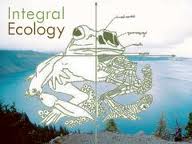This week we focused on Integral Ecology with An Overview of Integral Ecology by Sean Esbjorn- Hargens and Michael Zimmerman. As there are currently over 200 unique areas of study on the natural world, a system of comprehensive and consistent framework must exist to value and merge these varying perspectives. Integral ecology offers this framework. The authors break down this framework in several ways. One is the who, how and what perceptions of nature. They offer several visual models to break this down into 4 quadrants to illustrate these perspectives: 1. Intentional, 2. Behavioral, 3. Cultural, and 4. Social. Quadrant one is interior individual subjective, two is exterior individual objective, 3 is collective interior intersubjective and four is collective exterior interobjective. Hargens and Zimmerman note that academia and the public rarely consider the interior perspectives in regards to environmental problem solving.
The authors also break down the quadrants into different terrains with 1 being the terrain of experience, 2 -terrain of behavior, 3- terrain of culture and 4- terrain of systems. The terrain of experience is defined as “ The subjective realities of any organism at all levels of its perception” (p 4) The terrain of behaviors is defined as “The objective realities of any organism at all levels of its organization” (p 4) The terrain of culture is defined as “The intersubjective realisties of any organism at all levels of its communion” (p 4) and the terrain of systems is defined as “The interobjective realities of any organism at all levels of its intersection” (p 4).
These considerations might seem too in depth at first glance, but when one considers the goal- full accounting for all realms of perspective, it is necessary. Hargens and Zimmerman state that these quadrants are pertinent for creating understanding of world views, psychological properties, behaviors and patterns. It is through this understanding that we create a comprehensive understanding of the natural world and any attempts for problem solving in this domain. Coordination of these perspectives lead to integral pluralism which ensures correct understanding of the dynamics of ecology.

For the sake of providing some further background (as well as my own perspective, though I don’t want that to influence your readings of these two articles), here’s a piece I wrote about the climate change article. And here are a few links (the ones I’ve been able to find easily) to a multi-blog reading of the Integral Ecologies book that took place a couple of years ago: schedule, week 2, week 3, chapter 5 & 6, week 6, week 7, chapter 9.
I would like to echo Adrian’s piece on An Ontology of Climate Change by asking similar questions, and perhaps even framing things under Bruno Latour’s latest work in An Inquiry into Modes of Existence. Latour adapts the concept of ‘felicity conditions’ from speech act theory, which originally referred most generally to the conditions under which a speech act was effective (effectively conveyed to some audience so that the audience is either convinced that what the speaker is saying is true or simply understands what the speaker is saying). While some would utilize this theory as a rhetorical device to analyze the possibilities for getting a point across, I think that it’s an interesting metaphor that Latour uses for truth-making (veridiction) in different modes of existence (law, politics, and religion are some of the modes outlined by Latour, however many others have been filled in and identified on the online AIME application). While my own understanding of AIME is very limited, it is defined as grounding the “truth and falsity of a mode without immediately judging it solely according to constatives” (an affirmative statement indicating that something is the case). I’ve lately wondered how Latour’s modes of existence, which, to add on to Adrian’s post, also seems to be another way of engaging ‘ontopolitics’, ‘cosmopolitics’, and integral approaches, is another way of affirming the true enactment of something like climate change within the actual networks of the humans (the scientist) and nonhumans (the scientist’s tools and the ‘objects’ being called upon) enacting them – here I’m thinking about E-H’s ‘Who’, ‘How’, ‘What’. What does it mean to all simultaneously enact climate change (or the Anthropocene) in truthful ways? Does truth and felicity conditions, as they pertain to complex environmental issues, necessitate matters of concern (over simple matters of fact), that is, must we or are we obligated to conceive of the existence of climate change in relation to us (something we are concerned about), rather than as an entity out-there, albeit plural and multifaceted. I ask this, because while E-H’s insight on ontological pluralism and climate change is useful for showing how the “AQAL” model might be itself enacted in relation to issues like climate change, I haven’t found a meaningful way in which it addresses these multi-disciplinary perspectives as matters of concern (or is this under the inter-subjectivity quadrant?). Useful, yes, but how can integral ecology itself ‘integrate’ with the other speculative work being done in philosophy and the more empirical ‘social studies’ being conducted in STS, anthropology, geography, and other fields? Moreover, what fully distinguishes this integral approach from those others (besides trying to ‘integrate’ pluralist epistemologies/methodologies/ontologies)?